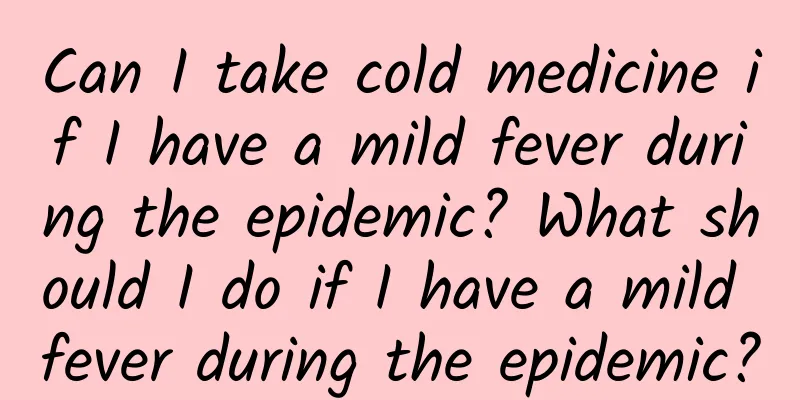Can I take cold medicine if I have a mild fever during the epidemic? What should I do if I have a mild fever during the epidemic?

|
We all know that the recent period is a critical period for the prevention and control of the new coronavirus. Many people need to be isolated at home for observation, especially those who travel to other places. The earliest symptoms of the new coronavirus are fever and dry cough. So can you take cold medicine for a mild fever during the epidemic? Let's take a closer look! Can I take cold medicine if I have a mild fever during the epidemic?If it is used to prevent the virus, taking cold medicine is useless. If you have cold symptoms, it is recommended to take personal protection and go to the hospital in time. Some symptoms of new coronary pneumonia are very similar to those of colds, so it is difficult to diagnose by yourself. The best solution is to go to the hospital for examination. The main symptoms of the new coronavirus are fever, fatigue and dry cough, but a small number of people will also experience symptoms such as nasal congestion, runny nose, sore throat, abdominal pain, etc., which are very similar to the common cold and influenza. It is very difficult to identify what disease it is based on these symptoms alone. What to do if you have a mild fever during the epidemicFirst of all, the normal armpit temperature of the human body is between 36.1 degrees Celsius and 37.3 degrees Celsius, and a fluctuation of 0.1 degrees Celsius within this range is generally normal. Therefore, only when the body temperature is approximately or equal to 37.5 degrees Celsius can it be considered to have a fever. Therefore, it is more critical to determine whether you have a fever when measuring your body temperature. Secondly, after having a fever, you need to see what your fever condition is like. If it is a high fever and persists, it generally indicates that the infection is more serious. However, if the fever is less than or equal to 38.5 degrees Celsius and can be easily lowered after taking antipyretics, it means that the infection is not very serious. Third, when you have a fever, you must check for other accompanying symptoms. If the fever persists and is accompanied by symptoms of coughing and difficulty breathing, you must see a doctor as soon as possible to check whether you have been infected with the new coronavirus. However, if there are accompanied by urinary tract irritation signs or swollen tonsils, it may not be a problem of new coronavirus pneumonia. Finally, when you have a fever, you must pay attention to the cause and medical history, especially whether you have had contact with people in the epidemic area, and whether there are people with pneumonia-like symptoms among the people you have contacted. These are all issues that need to be checked. However, if you have never left the house recently and have been in self-isolation at home for more than 14 days, and then you have a fever due to catching a cold or being blown by the wind, then you basically don’t consider the problem of new coronavirus pneumonia. To sum up, having a fever during the novel coronavirus pneumonia epidemic is not a good thing. After all, you and others will doubt whether you are a new pneumonia patient. Therefore, self-identification is very important, but don’t forget to seek medical attention in time. In addition to relying on possible fever and respiratory symptoms, the diagnosis of the new coronavirus also requires a comprehensive judgment based on the presence or absence of an epidemiological history, changes in white blood cells and lymphocytes in routine blood tests, and changes in the imaging signs of the new coronavirus. People suspected of being infected with the new coronavirus also need to undergo nucleic acid testing for the new coronavirus to confirm the diagnosis. Should I go to the hospital immediately if I have a fever during the epidemic?If you have a fever, whether you need to go to the hospital depends on the situation. Situation 1: No recent contact with suspected cases and no visits to public placesIn this case, if the fever is below 38.5℃ and there are no other symptoms, it is recommended to observe at home, drink plenty of water, and get enough rest. If necessary, you can use warm compresses to physically cool down. If the body surface temperature exceeds 38.5℃ and the high fever persists after physical cooling or taking antipyretics, it is recommended to go to the hospital in time. Case 2: No recent contact with suspected cases but has been outIn this case, it is recommended to observe isolation at home. If there is no improvement after 7 days and accompanied by diarrhea, dry cough, weakness, difficulty breathing and other symptoms, the community neighborhood committee and community hospital should be notified in time, and isolation should be done at the same time. What should you pay attention to when you go to the hospital with a fever during the epidemic?1. Go to the designated hospital's fever clinic (list attached) promptly for treatment. Make an appointment by phone before the visit. On the way to the hospital and in the hospital, the patient and accompanying family members should wear medical surgical masks or N95 masks throughout the process. 2. If possible, avoid taking public transportation to the hospital and open the car windows on the way. 3. Keep your hands clean at all times and prepare portable alcohol-based hand sanitizer. When on the road and in the hospital, stay away from other people as much as possible (at least 1 meter). 4. If the vehicle is contaminated during the journey, it is recommended to use chlorine-containing disinfectants or peracetic acid disinfectants to disinfect all surfaces contaminated by respiratory secretions or body fluids. 5. When seeking medical treatment, you should describe your illness truthfully and in detail, especially you should inform the doctor of your recent travel and residence history, contact history with pneumonia patients or suspected patients, history of contact with animals, etc. 6. Try to avoid touching your mouth, eyes, and nose with your hands. Cover your mouth and nose with a tissue when sneezing or coughing. 7. After touching hospital door handles, door curtains, doctor's white coats and other hospital items, try to use hand disinfectant. If you cannot disinfect your hands in time, do not touch your mouth, nose or eyes. When visiting the hospital, try to reduce the time you stay in the hospital as much as possible. 8. After the patient returns home, change clothes immediately, wash hands carefully with hand sanitizer or soap under running water, and wash clothes as soon as possible. |
Recommend
What is the cause of the dull pain in the vagina at 38 weeks of pregnancy?
The gestation period is relatively long, generall...
What causes low back pain in early pregnancy?
When lower back pain occurs in early pregnancy, p...
What are the symptoms of uterine incomplete mediastinum
Incomplete uterine septum is a manifestation of a...
How to take ethinyl estradiol cyproterone acetate tablets?
Ethinyl estradiol cyproterone acetate tablets are...
Digi-Capital: AR/VR investment reached $1.1 billion in 2016
199IT original compilation Augmented reality and ...
Girls have pain for no reason
Women will not experience pain down there for no ...
Experience of preserving pregnancy with heavy bleeding in early pregnancy
Many pregnant women experience threatened miscarr...
Is it painful to have a miscarriage one month into pregnancy?
If a woman does not want the baby in her belly, s...
The hottest beauty and skin care tips teach you how to use a bottle of lotion in N ways
Toner is the most indispensable part of the basic...
Female urethral anatomy and physiology
Some female friends may have experienced redness ...
Treatment for loose teeth after childbirth
Recently, many pregnant mothers did not take appr...
Please check the eye protection guide when traveling during the May Day holiday!
May Day Holiday Don’t take a “holiday” when it co...
What are the causes of back pain and limb weakness?
Many women often feel back pain and weakness in t...
What should pregnant women do if they have nasal congestion and runny nose?
Pregnant women catch a cold and have a runny nose...
What should I do if I eat screws during pregnancy?
Snails are not only delicious, but also rich in p...









